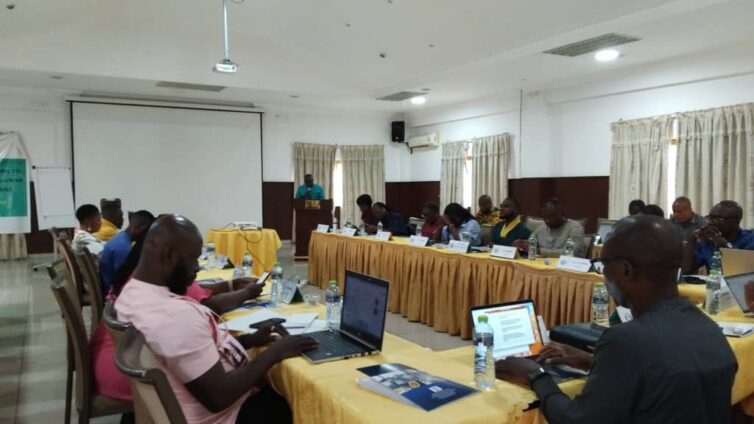To strengthen Ghana's democracy and ensure peaceful elections in December 2024, the Economic Community of West African States (ECOWAS) Commission has initiated a comprehensive engagement with the Ghanaian media.
The engagement, spearheaded by the ECOWAS Commission's Department of Political Affairs, Peace and Security, is focused on countering misinformation and disinformation, recognizing the critical role of the media in shaping the narrative and upholding the integrity of the electoral process.
A Model of Tribal Democracy
Ebenezer Ofosu Asiedu, Head of the Democracy and Good Governance Division at the ECOWAS Commission, delivered the keynote address, highlighting Ghana's significant strides in democratic consolidation.
Since the inception of the Fourth Republic in 1992, Ghana has been internationally recognized for conducting free and fair elections, establishing itself as a beacon of democracy in Africa. Ofosu Asiedu emphasized that the country’s democratic successes could not have been achieved without the vital role of the media, which has contributed immensely to public education, transparency, and governance.
"The media landscape in Ghana is one of the most vibrant in Africa," said Ofosu Asiedu. "Media outlets have played a crucial role in fostering democratic development, providing timely and factual information that has contributed to peaceful elections and reduced tensions during periods of uncertainty."
The Media's Role in Accountability
The Ghanaian media’s role extends beyond election periods, Ofosu Asiedu noted, with nearly 70% of Ghanaians affirming the media's pivotal role in holding the government accountable. This trust underscores the enormous responsibility of journalists to remain impartial, accurate, and committed to serving the public interest.
However, challenges remain. Ofosu Asiedu acknowledged the pressures faced by the media, including ownership biases, stringent legal frameworks, and political interference. These factors can undermine the media's ability to report fairly, especially in the current digital era where the rapid spread of misinformation and disinformation on social media platforms has become a critical threat to democratic processes.

Misinformation and Disinformation: A Threat to Elections
Rebecca Ekpe, Public Relations Officer of the Ghana Journalists Association (GJA), echoed the concerns over the growing threat of misinformation and disinformation as the 2024 elections draw near. "Misinformation is a great threat to our elections, and it places a heavy responsibility on journalists," she said. Ekpe detailed the GJA’s ongoing efforts to equip journalists with the tools and knowledge needed to combat disinformation, citing training programs organized with support from the U.S. Embassy and engagements with the Electoral Commission, police, and other relevant authorities.
Fact-Checking and Responsible Reporting
Sulemana Briamah, Executive Director of the Media Foundation for West Africa, addressed journalists on the importance of fact-checking and responsible reporting, especially during election seasons. His presentation delved into key topics such as hate speech, indecent language, and their implications for peaceful elections. Briamah urged journalists to be vigilant and accurate in their reportage to ensure that their work does not exacerbate tensions or mislead the public.

"Journalists have a responsibility to present facts, particularly in the heat of elections where misinformation can quickly destabilize the country," Briamah stressed. He added that journalists must counter falsehoods with credible information, particularly as Ghana heads into a critical election.
Preparing Journalists for Election Coverage
The ECOWAS Commission’s engagement program aims to deepen the media’s understanding of electoral processes and equip them with the skills to navigate the unique challenges presented by digital media. By fostering collaboration among journalists, the initiative seeks to bolster the country’s capacity to ensure peaceful, transparent, and credible elections.
Ofosu Asiedu concluded his remarks by calling on journalists to take ownership of their role as watchdogs of democracy, urging active participation in the exchange of ideas and experiences during the engagement. "Your role in shaping how this election is perceived, both nationally and internationally, cannot be overstated. Let us work together to create an accurate, fair, and peaceful electoral environment."
As Ghana prepares for its next general election, the commitment of its media professionals will be crucial in maintaining the country’s reputation as a democratic leader in Africa. This ECOWAS-led initiative marks an important step in supporting journalists to safeguard the integrity of the electoral process and protect the nation's democratic gains.
Latest Stories
-
Ballots, Boots & Broken Ribs: The Ablekuma Re-Run that Ran Amok
18 minutes -
Zelenskyy announces closer Ukraine-Ghana ties on agriculture and defence
31 minutes -
3 arrested in foiled robbery at Nyanikrom, GH¢149,500 recovered
38 minutes -
Focus on the Competition and Lose Your Product: A Political Marketing Lesson Ghana Must Learn
41 minutes -
Interior Minister decorates 19 newly promoted police officers
54 minutes -
Dr Adutwum condemns violence in Ablekuma North rerun, demands swift probe
1 hour -
Pearl Nkrumah, Antoinette Kwofie elected as representatives of listed companies on GSE Council
1 hour -
Ukraine ready to help Ghana secure its borders – Zelenskyy
2 hours -
Ghana interested in Ukraine’s drone production – Zelenskyy reveals
2 hours -
Livestream: Newsfile discusses Black Volta Gold fight
2 hours -
UniMAC students lead charge to fix Ghana’s pothole crisis
3 hours -
Alliance Rights and Health urges immediate action following AU pact on violence against women
4 hours -
Ghanaian woman fatally shot in Canada
5 hours -
Why cockpit audio deepens the mystery of Air India crash
5 hours -
Liverpool to retire number 20 in honour of Jota
5 hours

